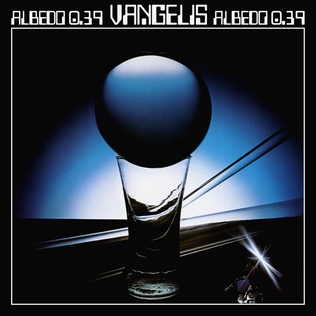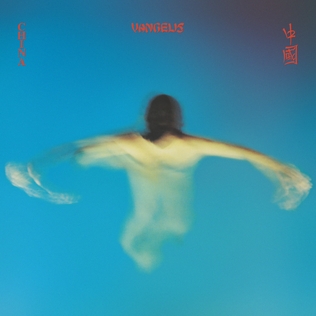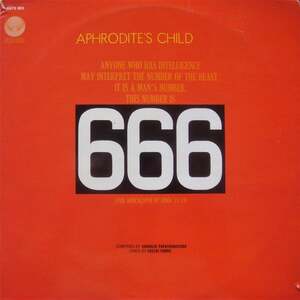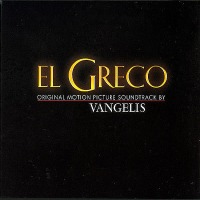
Evangelos Odysseas Papathanassiou, known professionally as Vangelis, was a Greek musician, composer, songwriter and producer of electronic, progressive, ambient, and classical orchestral music. He was best known for his Academy Award-winning score to Chariots of Fire (1981), as well as for composing scores to the films Blade Runner (1982), Missing (1982), Antarctica (1983), The Bounty (1984), 1492: Conquest of Paradise (1992), and Alexander (2004), and for the use of his music in the 1980 PBS documentary series Cosmos: A Personal Voyage by Carl Sagan.

Albedo 0.39 is a studio album by the Greek electronic composer Vangelis, released in 1976. It was the second album produced by Vangelis in Nemo Studios, London, which was his creative base until the late 1980s. It contrasts with his previous album, Heaven and Hell, which was classically inspired and choral, while Albedo 0.39 has blues and jazz overtones. It was his first Top 20 UK album.

Heaven and Hell is a studio album by Greek electronic composer Vangelis, released in December 1975 on RCA Records. It is the first album recorded at his Nemo Studios in London that he used until 1987. It is a concept album based on duality.

Direct is a studio album by the Greek electronic composer Vangelis, released in 1988. The album marks a new development in Vangelis' music, during which Vangelis moved his creative base from London to Athens in Greece, and it was his first album recorded in Athens after relocation from London.

Mask is a 1985 album by the Greek electronic music composer Vangelis. It was the last he produced for the Polydor label. It is dramatic work in six movements, with somewhat dark mood and classical style which branches into ethnic styles. The album reached #69 position in the UK album charts.

Opéra Sauvage is a soundtrack album by the Greek electronic composer Vangelis, released in 1979. It is the score for the nature documentary of the same title by French filmmaker Frédéric Rossif. It is considered one of Vangelis' best albums, and is his second most successful album in the USA, reaching #42 in the album charts.

China is a studio album by the Greek electronic composer Vangelis, released in 1979. Although he had never been to China, he employed Chinese instruments and compositional styles on this concept album. It was thematically ahead of its time as the eastern cultural concepts were mostly unknown to the western audiences. It is one of his most critically acclaimed solo studio albums. It was certified silver (1985) for sales of over 60,000 copies by BPI.

See You Later is an album by the Greek electronic composer Vangelis, released in 1980. It breaks quite violently with the style he had employed in the late 1970s and later, relying much more on vocals and being more experimental and returning to his early 1970s work like Earth or 666. It was never released in the United States, until it was remastered in 2016 as part of the Delectus boxset.

666 is the third and final studio album and only double album by Greek progressive rock band Aphrodite's Child, released in June 1972 by Vertigo Records. Ostensibly an adaptation of Biblical passages from the Book of Revelation, it is the group's most critically acclaimed project. Due to internal tensions during the recording process and conflict with the record company, by the time it was released the band had already disbanded and its members had begun work on solo projects.

Blade Runner: Original Motion Picture Soundtrack is the soundtrack for Ridley Scott's 1982 science-fiction noir film Blade Runner, composed by Greek electronic musician Vangelis. It has received acclaim as an influential work in the history of electronic music and one of Vangelis's best works. It was nominated in 1983 for a BAFTA and Golden Globe for best original score. The score evokes the film's bleak futurism with an emotive synthesizer-based sound, drawing on the jazz scores of classic film noir as well as Middle Eastern texture and neo-classical elements.

Invisible Connections is a 1985 album by Greek electronic composer Vangelis.

Antarctica is a 1983 Japanese drama film directed by Koreyoshi Kurahara and starring Ken Takakura. Its plot centers on the 1958 ill-fated Japanese scientific expedition to the South Pole, its dramatic rescue from the impossible weather conditions on the return journey, the relationship between the scientists and their loyal and hard-working Sakhalin huskies, particularly the lead dogs Taro and Jiro, and the fates of the 15 dogs left behind to fend for themselves.

Soil Festivities is a studio album by the Greek electronic composer Vangelis, released in 1984.

Voices is a studio album by Greek electronic composer Vangelis, released in 1995.

Chariots of Fire is a 1981 musical score by Greek electronic composer Vangelis for the British film Chariots of Fire, which won four Academy Awards including Best Picture and Original Music Score.

Oceanic is a 1996 studio album by Greek electronic composer Vangelis. It was released in Europe on October 25, 1996 by East West Records, and in the United States on January 28, 1997 by Atlantic Records. A single "Song of the Seas", with b-side "Aquatic Dance", was released simultaneously.

Alexander is the original film score of the film Alexander (2004), scored by Greek electronic composer Vangelis. It received the Public Choice Award at the 2005 World Soundtrack Academy.

El Greco is a soundtrack album featuring the music score for the 2007 film El Greco, by Greek electronic composer Vangelis, released in Greece and Cyprus by Universal Music Greece. The film, directed by Yannis Smaragdis, follows the life of Greek painter, Doménicos Theotokópoulos, as he travels to Italy and Spain where he becomes known as El Greco. Vangelis previously worked with Yannis Smaragdis on his 1996 movie about the Greek poet Kavafis. It won the award for best music score at the 48th Greek State Film Awards in 2007.

Vangelis was a Greek musician, composer, and producer. He began his music career in the 1960s with the Greek progressive rock band Aphrodite's Child and in the 1970s began composing electronic music. He gained wide mainstream popularity after composing soundtracks to film Chariots of Fire (1981) and Blade Runner (1982). His solo career discography consists of 23 studio albums, 26 compilation albums, 12 soundtrack albums, and roughly 29 singles. The majority of his film, documentary, theatre, and ballet & dance scores weren't released or officially released. He also collaborated with Jon Anderson and as a duo Jon and Vangelis released 4 studio albums, 2 compilations, and 13 singles, and with Irene Papas released two studio albums.
Dilate was an ambient solo project begun in 1996 by composer and synthesizer player Victor Wulf, formerly of the sound collage and industrial music band Vampire Rodents. Wulf released the studio album's Cyclos and Octagon for Hypnotic Records in 1996 and 1997 respectively.


















